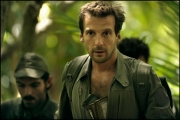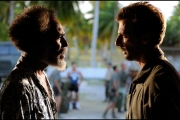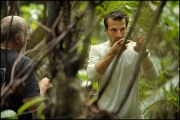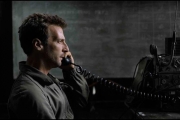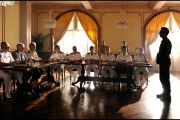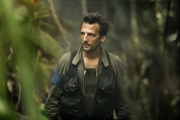Synopsis
April 1988, Ouvéa Island, New Caledonia. 30 gendarmes are taken hostage by a group of Kanak freedom fighters. 300 soldiers are deployed from France to re-establish order. Two men confront each other: Philippe Legorjus, Head of GIGN (French National SWAT team) and Alphonse Dianou, the leader of the kidnappers.
Through their shared values, they will attempt to make discussion triumph. But, in the midst of a presidential election, when the stakes are political, order isn’t always dictated by morality.
Cast & Crew
Director : Mathieu Kassovitz
Screenwriter : Benoît Jaubert, Mathieu Kassovitz, Pierre Geller
Starring : Mathieu Kassovitz, Iabe Lapacas, Malik Zidi, Alexandre Steiger, Philippe Torreton, Sylvie Testud, Patrick Fierry, Jean-Philippe Puymartin, Stefan Godin, Aladin Reibel, Olivier Rousset, Marc Robert, Simon-Pierre Boireau, Armel Cessa, Serge Dupuy
Schedule & Presentation
![]() Presentation by and discussion with actor Philippe Torreton
Presentation by and discussion with actor Philippe Torreton
Saturday, March 31 – 3:30 p.m at the Byrd Theater ~ ![]() 2h16 ~ Parental Guidance
2h16 ~ Parental Guidance
More informations
Choose a picture to see the filmography (source : IMDB)
![]()
How did you become interested in the events in Ouvéa and Philippe Legorjus?
Thirteen years ago, my father gave me Enquête sur Ouvéa to read. It was a minute-by-minute account of what happened. Of course, I remembered some of events — I was eighteen at the time. I remembered the version given by the TV: native Kanaks had slaughtered policemen with machetes and taken others hostage. There had been decapitations and rape… I remembered what Chirac, who was Prime Minister at the time, had said: that these were human beings who did not deserve to be treated as such… In this book, I discovered a completely new side of things. It was the result of an investigation that exposed abuses that led to the death of 19 Kanaks.
Throughout this incredible story, there was one recurring character: Captain Philippe Legorjus, a GIGN officer (French national SWAT Team) sent to negotiate with the hostage-takers who found his hands tied by politicians and the military. Later on when I was shooting Crimson Rivers, one of the actors, Olivier Rousset, told me that in 1989 he had lived in New Caledonia for six months, he had met people who had gone through the events of Ouvéa. He told me how he fell in love with the country and its people. I asked him to book me a trip there and introduce me to the Kanaks.
Did you go with the film in mind?
Yes. I knew there was material for a wonderful movie and the script was virtually written. During the first trip in 2001, we did not talk about the movie. We just took a look around to see who I was dealing with. I was wondering how I could get such a project off the ground and if it was possible to shoot it over there.
Ten years had passed since the events but people were still withdrawn into their grief. The nineteen dead men came from tribes and families that are all linked together in some way or another. Olivier introduced me to Mathias Waneux (a Kanak tribal chief as well as a business and political leader) who also has a part in the movie. We stayed at his place while we were over there. He talked us through the “custom” and pleaded our case with the various factions. Mathias warned us that it may be too soon, and that we would most likely have to wait another ten years before being able to make the movie. When I got home, I started working on the script. In the following five years, I went back on several occasions, partly for research purposes and partly to assess the realistic possibility of making a movie. Each time we had to go through the ritual at the heart of Kanak culture: the “custom.”
How would you define the “custom”?
The custom is a discussion that ends in a tacit agreement, which must not be broken because it is made face-to-face. The Kanak society is based on a person’s word. We went through the whole process with Olivier. They said, “You can make this film if everybody agrees to it.” We asked what they meant by “everybody” and they replied “All the victims’ families as well as anybody who is in the custom and is thereby entitled to his or her say.” As a result, we often found ourselves explaining to forty or more people what we wanted to do and why. What complicated matters for me from the outset was that I wanted to tell the story from the point of view of Philippe Legorjus, whom many Kanaks believe betrayed them, precisely because he did not — or could not — keep his word.
Why were you so determined to tell the story from Legorjus’s point of view?
Because he is the thread that runs through the whole story. Because it was an arduous and intense life experience for him. At the time, I had not met him yet, but I had read his book, “La morale et l’action” (lit. Morality and Action), which gives such a clear picture of everything he went through — how a relationship of trust was forged between him and the rebels’ leader, Alphonse Dianou, and how he had to betray him in spite of himself. It is almost Shakespearian! It is only through Legorjus’ eyes that we could expose both the political and human sides. I explained that to the Kanaks during the custom and they replied, “Fine, but he is a traitor.” I told them that the point of the movie was not to portray him as a hero — nor as a traitor — but to simply tell the story of what he went through. During the customs, we were often facing people who were very wary of white men and mainland French people — young 25-year-olds who were only 5 when their father or uncle were killed and who still live with that memory, the image of their father or uncle sprawled on the ground with a bullet in his body. It’s even worse that nobody ever talks about it. Some people rebuked us for opening up old wounds. We tried to explain that, on the contrary, it could be actually a way for them to heal.
Could you tell us what touches you most in this story?
The relationship that matures between the GIGN officer and the young separatist leader; and also the encounter between these two characters who are immediately on the same wavelength. They share the same ambitions and need for justice. The GIGN is not a typical special-forces unit. These guys have their own philosophy and sense of ethics. If a mission results in someone’s death, they consider it a failure. Legorjus wanted to be a monk. In 1968, he fought against the riot-control units he later joined. Alphonse Dianou also wanted to be a priest; he studied theology for seven years and later committed himself to a struggle that he did not even necessarily want but wholly embraced to the point of self-sacrifice. It is fascinating to work on two characters that are so contradictory and yet so similar. What touches me first and foremost is the human angle. After that, the terrible injustice of it all. The whole political issue that unfolded as I was digging deeper into the story was captivating. How can politicians be so willing to sacrifice hostages in order to serve their own interests? Also, the story has a universal aspect that fascinates me. The way we plunder the resources of a population while imposing laws that can never even work there. And, even more than that, there is the pressure of the presidential elections at stake!
What was the trickiest part of the writing process?
Having two hours to tell the story of ten days that were extremely complex on almost every level — historically, culturally, socially, militarily and politically. That was the real challenge and it took us a very long time to get it done. In the end, I think I wrote at least 25 drafts!
You did not involve Philippe Legorjus in the writing process?
No. In fact, I only met him once the project was well underway. But after that I gave him all the early drafts of the script to read. I needed his opinion on the direction we had decided to go, as well as some constructive criticism. I knew how much this story meant to him. Those ten days changed him forever. He started his life over shortly afterwards by resigning from his unit. He still has the greatest respect for his unit but he continues to abhor the cowardice of politicians. That actually surprised me, but it’s also reassuring!
Did you send the script to the Kanaks as well?
Yes, we did the same thing with the Kanaks. But when you are in a village where no one has ever read a script but they all want to read yours, and they all stop at the top of the second page which reads “Legorjus wakes up at home” to ask you “What are we doing in Legorjus’s house?”, you tell to yourself that the fun is just beginning. At the same time, what was important was that it brought people together. Many Kanaks, for whom Mathias Waneux acted as a kind of spokesperson, felt the need to atone for their faults and meet the families of the policemen. It was something only they could do, and they saw in our project the opportunity to meet them and Legorjus. He needed to meet them as well and explain what he did and why. In order for us to keep the project moving forward, mutual understanding was essential so they could come to terms with their anxieties and lay their ghosts to rest. For five years, we worked like crazy. On every level.
Did you plan to play Philippe Legorjus from the start?
No, I looked for another actor first, but I soon realized that the movie was going to be long and hard to make. We constantly went from “Yes, we can do it” to “No, we can’t.” I could not hire an actor when I was not sure we would ever actually shoot, with obvious consequences for the film’s funding. Above all, it soon became obvious that, for the people I was dealing with, acting as Legorjus would be the best proof of my total commitment to the project.
What was most complicated for you as an actor?
The real Legorjus is a professional, who does not let emotions get the better of him because they hamper judgment. Before I met him, I pictured him as a much more romantic, cinematographic character, but his professionalism soon became the main axis of the movie for me, as both director and actor. It allowed me to step back from his point of view and let History with a capital “H” take over. He was guiding us through History and not his story.
Beside you, Sylvie Testud, Philippe Torreton and Malik Zidi, the cast is not that well known…
The major problem was to find the right person to play Alphonse Dianou. I think there are only five Kanak actors listed in mainland France, and four of them were the wrong age for the part. We thought about casting African or Caribbean actors, but soon ruled that out. We could shoot somewhere else, but we could not make the movie without Kanaks. I looked for “my” Alphonse in villages, in Nouméa, absolutely everywhere. Even then, I knew that as soon as I found him, he would be in a very tricky position. Would he be entitled to play Alphonse if he was not part of the family? Would his tribe agree to it? Would his family be okay with it? It was not just about finding a good actor. Then my casting director found Iabe Lapacas, a Kanak living in France and studying law, who also happens to be Alphonse Dianou’s cousin. After asking his family, Iabe accepted the part, fully aware of what he was getting himself into. All I did was teach him the basics of acting — breathing, pitch, rhythm… The rest clicked into place. It was the same with Philippe de Jacquelin Dulphé, who plays General Vidal and is a genuine military man, a former colonel. He had something to say about what it means to be a soldier. When I considered my cast, I thought, “We will have a Kanak who has never acted before playing Alphonse, surrounded by about thirty other guys who have never been in a movie either. Who do I cast with them? Real actors? Well-known faces?” Instead, I went looking for ex-soldiers, foreign legionaries or guys from the GIGN, some of whom were living there. I mixed them with real actors, which kept everybody on their toes.
Did you work with the GIGN?
No, the GIGN could not be directly involved in the movie, but we worked with former GIGN operatives who now work as movie consultants and took us on a week’s training course, which helped the group bond and brought people’s egos down a notch. Pretty much everybody got into it, and it was not easy because the shoot itself was quite tense. On one side, you had the guys playing the GIGN operatives and on the other the Kanaks whose relatives had been killed by various military units…
Rebellion has a dramatic power and range, a cinematic sixth sense that we are glad you rediscovered.
The cinematic sixth sense comes with the subject itself. And with the right production company — in this case Nord-Ouest — which makes a huge difference to how a movie is made. Here, everything came together. Above all, I am dealing with a subject that allows me to express something. At first, we were due to shoot in New Caledonia but I saw the shooting budget diminishing as other expenses grew so I talked to my director of photography Marc Koninckx about shooting the movie with a handheld camera, documentary-style, without a real shot breakdown but with the camera at the heart of the action, a bit like Paul Greengrass’ Bloody Sunday, which I adore. In the end, I kept that approach for the attack on the police station and the assault on the cave. But when we relocated the shoot away from New Caledonia, there was not the same pressure because we were on neutral ground, so I thought we could shoot a more poised, structured, directed movie, which is more my style.
This film sees you dealing with political issues again. Is that something you have missed in the recent years?
I cannot say I have missed it because I have been working on this project for ten years! If everything had gone according to plan, I would have made this movie in 2004. But when the project stalled, I had to find a film to make. First of all, Gothika came along, then Babylon A.D., which took five years to get off the ground. On top of that, I was offered some fine parts as an actor in Amen and Munich, which also deal with political issues.
The title of Philippe Legorjus’ book is Morality and Action and the original French title of your movie is Order and Morality…
For Philippe, morality and action sum up his life. They have been his guiding principles. Order and morality are the issues at stake in my movie. Can they be reconciled? If so, how? The title works on several levels, from General Vidal’s line when he says, “You will obey orders even if they contravene your personal morality” to Bernard Pons’ “We will restore order and morality.” As if they were the same thing…
In Rebellion, you use the music in a particular way, especially during the final sequences when it reinforces the dramatic aspect of the assault.
Music in movies has always raised certain questions for me. I tend to be wary of directors who overuse music. It is so easy to manipulate audiences with it. I have always believed that if there is music it has to be totally justified and just right. When I was thinking of filming Rebellion documentary-style, I was inclined not to use any music at all. But when I decided on a more structured, composed style, I soon realized that I could not do without music. But there was no way I was going to lay violins over close-ups of Legorjus to ratchet up the emotion. I called Klaus Badlet, who had worked with Hans Zimmer on Terrence Malick’s movie, and I talked to him about another film score I really liked — Full Metal Jacket, a slightly discordant military theme. I also mentioned another fantasy of mine as a director, which I try to make real as often as I can: using a theme in the last five or ten minutes that starts softly and crescendos to the end of the movie, like Ravel’s Bolero or Carmina Burana. To make that surge of power even stronger and more dramatic, I did not want classical instruments. We worked with the industrial percussion band Les Tambours du Bronx, who performed the score in their own way. It gives us this very particular sound, like a military drum roll, but on metal crates so that it begins to sound like a rumbling tank.
When and how did you hear about Mathieu Kassovitz’s planned movie about the events in Ouvéa?
Three to four years ago, I think, when local media in New Caledonia mentioned he was planning to shoot a film there. For me, it all began in late April 2010 when I was studying for my exams. I received a phone call: “Hi, I’m David Bertrand, casting director on Mathieu Kassovitz’s movie Rebellion…” I was about to hang up, but he said, “No, do not hang up. Jean Boisserie gave me your name and number.” Jean Boisserie is a “big brother” who is also an actor. He is from back home and came to France in the 1960s. David told him he was looking for a guy to play Alphonse Dianou and Jean thought of me, without even knowing I was related to Alphonse. He told David, “Call him and make sure you tell him first thing that I gave you his number or he will never talk to you.”
What appealed to you or touched you most in the screenplay?
I thought it was very well written. It was the first time I read a movie script and I caught myself picturing the action in my mind as I read it. I understood Mathieu’s idea of focusing on Legorjus and using the Kanaks’ cause, or that of the independence movement, as a counterpoint. If I had not liked the script, I wouldn’t have done it.
You were very young when the events occurred. What memories of them do you have?
In 1988, I was six years old, so I do not have many recollections of the events. Besides, back home, we do not talk about it much. We talk about it without really discussing it, as if in some way our parents were trying to protect us. It was definitely a tragedy, though, and a very complex event from a political point of view.
How did Mathieu Kassovitz convince you to do the movie?
It is his whole journey with Olivier Rousset back home. It was important. If he had not made that trip, I’m not sure I would have accepted. To direct a film like this, there was a path to follow and he followed it. Where his genius came out was in making a complex story intelligible and comprehensible. Something else that swayed me is that he dares to talk about what happened in the cave at Ouvéa. Talking about that means talking about the troubles, the Kanak people’s struggle against the French colonial system of the time.
Once you were chosen and agreed to do it, did you do any research into Alphonse Dianou?
The information came to me quite naturally. Olivier Rousset arrived in France from back home and told me about it. Auntie Patou (Alphonse Dianou’s sister) had given him a letter for me. I called her. She sensitized me to certain issues and encouraged me, like mamas do back home. I could draw on that. I also drew on the knowledge of people who knew him and were with him in the cave.
Now that you have played him and have a better understanding of who he was, what touches you most about Alphonse Dianou?
His unconditional commitment, which keyed into what my parents had taught me: work with love, respect and humility. Like Legorjus, Alphonse was a man of faith. That is why they got on so well. They both almost took holy orders. One chose to become a soldier and the other went into politics.
Did it make you want to keep acting?
Why not? It will depend on the parts I am offered, but there is only one Mathieu Kassovitz. Mathieu is a great director. He lets people take their time and come to terms with the requirements of the job — his actors, at least, because it is a whole different ball game for the crew! [Laughs] He trusts you and that trust boosts your confidence and faith in yourself.
What would you like audiences to remember about the movie?
First of all, I would like them to grasp the Kanak’s struggle for their independence. And I would also like for it to remind politicians of their responsibilities, because they often dodge them. Politics should be about stopping people from settling conflicts in an eye-for-an-eye or survival-of-the-fittest kind of way.
Born in 1951, Philippe Legorjus graduated in law from Caen University. Passionate about theology and philosophy, and an activist in the May 1968 student movement, he hardly seemed cut out for a military career. Nonetheless, he enlisted in the Gendarmerie in 1979 and became a member of its elite unit, the GIGN, in 1982. He was made GIGN commander in 1985 and was thrust into the spotlight by the tragic events in Ouvéa.
When did you first hear of Mathieu Kassovitz’s project?
In 2004 or 2005, when Mathieu contacted me. He had read my book, Morality and Action, and told me he wanted to turn it into a movie. We met up and immediately got on well, but to begin with I was pretty reticent about transposing what I had written in 1990 into a cinematic form.
Why?
The events in Ouvéa only represent part of the book. It was a way of drawing a line under that part of my life. And that is what I did. I went from the military-style world of the Gendarmerie to the civilian life. I needed something solid to mark that turning point. This is why I wrote the book. The publisher had raised the issue of rights for a possible film adaptation and I had always thought that if it ever happened it could not be a Hollywood-style action picture. Then, around 2004, Mathieu turned up and explained his project in a very appealing way. He had just got back from Ouvéa, where he got a feeling of the situation. His approach seemed worthy of interest so we started to discuss.
Were you surprised when he said he would be playing you?
Yes and no. He first talked to me about actors he was thinking of. But when he started writing alone and began to drive the project almost on his own, it struck me as logical for him to go all the way and play my character. I was fine with it because we had spent goodness knows how many hours together and in the film world, he is clearly the one who knows me best and who was, therefore, best placed to play me. Unlike everything you see from actors in movies nowadays, Mathieu gives such a simple, understated performance. He is always right, never over the top.
How do you explain his desire to make a movie about this episode?
It is still a mystery to me. I think his first stay with the Kanaks deeply affected him. He had no clue of the Melanesian culture and it really touched him. I also think the story itself spoke to him in the differences it throws up between human beings, even soldiers in the field of operations, and a supposedly higher authority disdainfully rolling over human lives. It clearly resonated with the rebellious side of him.
In what way do you think it is important that such a film exists today?
It is important because French politicians (let’s say, since de Gaulle died) refuse to accept their responsibility in such historical events and thereby deprive the following generations of clear explanations. But it is better to redeem negative acts than leave them to fester in silence and caricature, so it is important to revisit the past, not only for the future but also for the present.
What did you think of the assault scene?
It is very powerful and pretty accurate, but paradoxically I was much more impressed by the accuracy of the depiction of the relationship between Legorjus — sorry to talk in the third person — and Alphonse Dianou. And by the atmosphere that prevailed in the Kanak village, which is very close to the reality.



